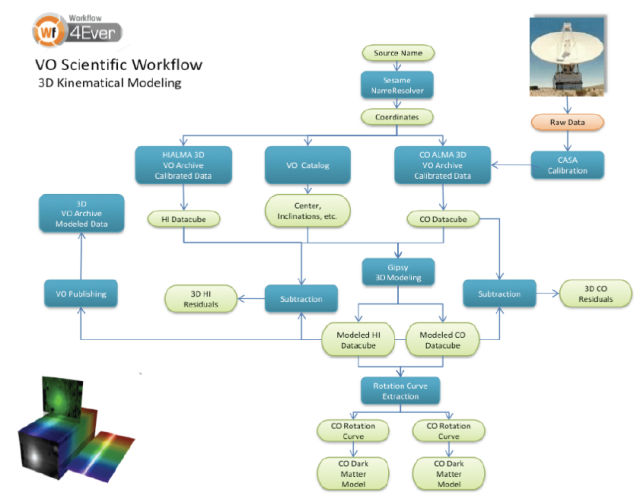
WALLABY Pre-pilot Survey: The Effects of Tidal Interaction on Radial Distribution of Color in Galaxies of the Eridanus Supergroup.
Wang et al. 2022. ApJ, DOI:10.3847/1538-4357/ac4270
The Westerbork Coma Survey. A blind, deep, high-resolution H I survey of the Coma cluster.
Molnár et al. 2022 A&A, DOI: 10.1051/0004-6361/202142614
Dpt. Astronomía Extragaláctica
Instituto Astrofísica Andalucía
Glorieta de la Astronomía s/n
18008 Granada
Spain
Wf4Ever - Preservation of scientific workflowsCheck AstroTaverna Plugin for Taverna Workbench workflows management software ! One of the current challenges in Astronomy is the efficient exploitation of the huge volume of data currently available. This efficiency is needed in order to ensure the prompt return of the big investments made in terms of facilities to obtain those data, something that clearly the traditional methods of analysis are not currently achieving. This is the reason why scientific workflows are becoming a need in Astronomy. The systematic capture of the scientific process into a digital Research Object (RO) enables researchers to create, re-use, and share the full methodology and agents of an experiment. The RO is a container of the lifecycle of an experiment, linking data, services and tools for their analysis, producing executable papers which go well beyond the pdf. This disruptive methodology reduces effort duplication and ensures repeatability of the discovery process, which finally leads to a complete change of paradigm in the way research is performed. Since December 2010, the AMIGA group is a participant in a EU FP7 funded project - Wf4Ever: Advanced Workflow Preservation Technologies for Enhanced Science - in order to contribute to the development of standards and models for the preservation of scientific workflows. Main goals
Actions
Astronomy is a collaborative science, but it has also become highly specialized, as many other disciplines. Scientific workflows will enable astronomers to greatly benefit from each other’s highly specialized know-how, they constitute a way to push Astronomy to share and publish not only results and data, but also processes and methodologies. Astronomers must hence be encouraged to document their methodology in a clear, concise and modular universal language.
Golden Exemplar for a 3D Kinematical Modelling VO web-services-based scientific workflow At the start of this project most of the required individual infrastructures are either in place, or being developed with the goal of the interoperability of both data and methods through the Virtual Observatory initiative, although essentially no scientific workflows exist in Astronomy. Our first step is to build a representative set of Golden Exemplars, and subsequently assemble all of the involved pieces through preserved scientific workflows. Participants
Publications
Technical Notes Presentations in Conferences The AMIGA group has contributed to the dissemination of Wf4Ever Project in several technical and astronomy forums. --- This work is being supported by Grant AYA2008-06181-C02 and AYA2011-30491-C02-01, co-financed by MICINN and FEDER funds, and the Junta de Andalucía (Spain) grant P08-FQM-4205, as well as under the EU 7th Framework Programme in the area of Digital Libraries and Digital Preservation. (ICT-2009.4.1) Project reference: 270192. |




